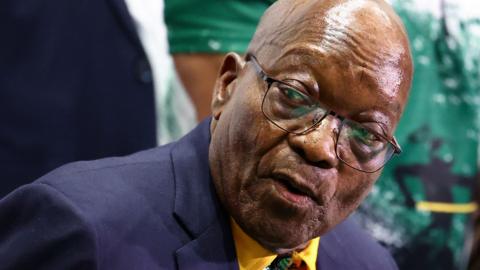In a striking and unexpected admission, former ANC President Jacob Zuma has revealed that his ultimate goal is to remain in the African National Congress (ANC) not just as a member, but to eventually take control of the party and “rescue” it from what he perceives as the leadership’s abandonment of its founding values. Speaking candidly on a recent podcast, Zuma outlined his belief that the current ANC leadership has deviated from the principles of its ancestors and that only he has the vision and ability to return the party to its roots.
Despite his harsh criticisms of the ANC over recent years and his controversial expulsion from the party, Zuma is unyielding in his desire to stay within the organization. He delivered a legal ultimatum to the ANC last week, demanding his reinstatement by January 31 or face a court challenge. Zuma’s letter of demand, delivered through his lawyer Thabo Kwinana, asserts that the ANC’s disciplinary processes were flawed and irregular, suggesting that an independent review could easily reverse the decision.
While his critics view this as a thinly veiled attempt to cause further chaos within the ANC, Zuma remains resolute in his argument. He pointed out that being an outsider would hinder his ability to influence change. “If I was not a member of that organisation, it would be very difficult to try to change it from the inside,” Zuma explained, highlighting his belief that only by remaining within the party can he make a meaningful impact on its future.
However, Zuma’s comments take a dramatic turn when he insists that although he plans to stay a member of the ANC, he would never vote for the party in any future elections. His reasoning is simple: his membership allows him the platform to reshape the party from within, but he has no faith in the current leadership. “I’m remaining there deliberately so that I have an opportunity to take over that organisation,” he boldly declared, setting the stage for what could be a prolonged internal struggle.
Zuma’s remarks come at a time when the ANC is grappling with internal divisions and ongoing power struggles. The ruling party has seen factionalism worsen, particularly since Zuma’s departure from office. His comments about infiltrating the party and steering it in a new direction are likely to inflame existing tensions. Some party members view Zuma as a disruptive force, while others still believe he is the embodiment of the party’s historical struggles.
Political analysts are divided on the impact of Zuma’s plans. Professor Siphamandla Zondi of the University of Johannesburg notes that Zuma’s bitterness stems from his view that the current leadership of the ANC has been co-opted by “White Monopoly Capital” and the liberal right. Zuma, he argues, believes he is fighting to preserve the party’s original mission, which he feels has been eroded by forces outside of the traditional ANC struggle. Zondi also highlights that Zuma’s creation of the uMkhonto weSizwe Party (MKP) is an extension of his long-standing frustrations with the ANC, a party he sees as increasingly disconnected from its founding ideals.
Meanwhile, analyst Sandile Swana points out that Zuma’s ambitions to return to the ANC could face significant legal and procedural obstacles. Since his expulsion, rejoining the party would be difficult, especially given the ongoing opposition to his return within the ANC’s leadership. “Zuma has stripped the ANC of structural building material,” Swana says, suggesting that his departure and subsequent actions have left a lasting impact on the party. Furthermore, the ANC’s strict adherence to its tripartite alliance means that dual membership with parties like the MKP is not permitted.
As Zuma’s fight with the ANC continues, the question of whether he will succeed in his bid to reclaim the party—and perhaps lead it once again—remains to be seen. His intentions could set the stage for another chapter in the ANC’s storied history, one that may deepen the party’s existing internal rifts or spark a broader reckoning with its future direction. Whatever the outcome, it is clear that Zuma’s influence, whether accepted or contested, will continue to play a central role in South African politics for the foreseeable future.
